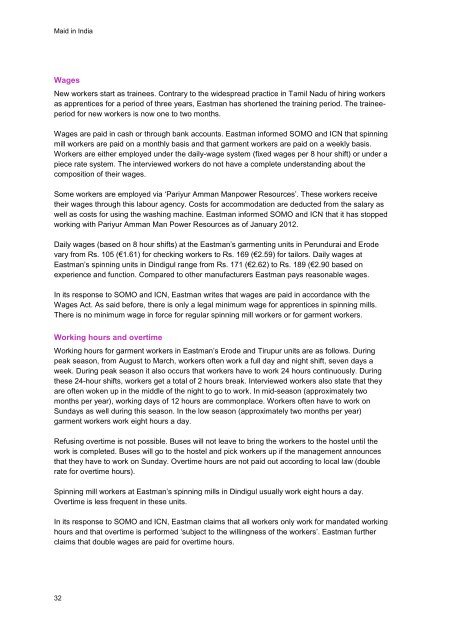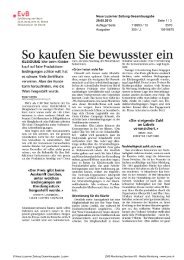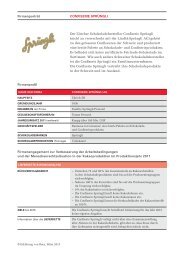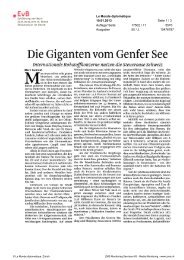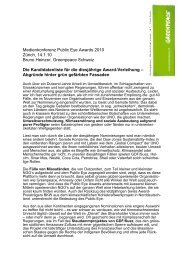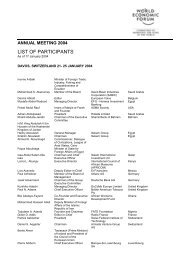Maid in India
Maid in India
Maid in India
You also want an ePaper? Increase the reach of your titles
YUMPU automatically turns print PDFs into web optimized ePapers that Google loves.
<strong>Maid</strong> <strong>in</strong> <strong>India</strong><br />
Wages<br />
New workers start as tra<strong>in</strong>ees. Contrary to the widespread practice <strong>in</strong> Tamil Nadu of hir<strong>in</strong>g workers<br />
as apprentices for a period of three years, Eastman has shortened the tra<strong>in</strong><strong>in</strong>g period. The tra<strong>in</strong>eeperiod<br />
for new workers is now one to two months.<br />
Wages are paid <strong>in</strong> cash or through bank accounts. Eastman <strong>in</strong>formed SOMO and ICN that sp<strong>in</strong>n<strong>in</strong>g<br />
mill workers are paid on a monthly basis and that garment workers are paid on a weekly basis.<br />
Workers are either employed under the daily-wage system (fixed wages per 8 hour shift) or under a<br />
piece rate system. The <strong>in</strong>terviewed workers do not have a complete understand<strong>in</strong>g about the<br />
composition of their wages.<br />
Some workers are employed via ‘Pariyur Amman Manpower Resources’. These workers receive<br />
their wages through this labour agency. Costs for accommodation are deducted from the salary as<br />
well as costs for us<strong>in</strong>g the wash<strong>in</strong>g mach<strong>in</strong>e. Eastman <strong>in</strong>formed SOMO and ICN that it has stopped<br />
work<strong>in</strong>g with Pariyur Amman Man Power Resources as of January 2012.<br />
Daily wages (based on 8 hour shifts) at the Eastman’s garment<strong>in</strong>g units <strong>in</strong> Perundurai and Erode<br />
vary from Rs. 105 (€1.61) for check<strong>in</strong>g workers to Rs. 169 (€2.59) for tailors. Daily wages at<br />
Eastman’s sp<strong>in</strong>n<strong>in</strong>g units <strong>in</strong> D<strong>in</strong>digul range from Rs. 171 (€2.62) to Rs. 189 (€2.90 based on<br />
experience and function. Compared to other manufacturers Eastman pays reasonable wages.<br />
In its response to SOMO and ICN, Eastman writes that wages are paid <strong>in</strong> accordance with the<br />
Wages Act. As said before, there is only a legal m<strong>in</strong>imum wage for apprentices <strong>in</strong> sp<strong>in</strong>n<strong>in</strong>g mills.<br />
There is no m<strong>in</strong>imum wage <strong>in</strong> force for regular sp<strong>in</strong>n<strong>in</strong>g mill workers or for garment workers.<br />
Work<strong>in</strong>g hours and overtime<br />
Work<strong>in</strong>g hours for garment workers <strong>in</strong> Eastman’s Erode and Tirupur units are as follows. Dur<strong>in</strong>g<br />
peak season, from August to March, workers often work a full day and night shift, seven days a<br />
week. Dur<strong>in</strong>g peak season it also occurs that workers have to work 24 hours cont<strong>in</strong>uously. Dur<strong>in</strong>g<br />
these 24-hour shifts, workers get a total of 2 hours break. Interviewed workers also state that they<br />
are often woken up <strong>in</strong> the middle of the night to go to work. In mid-season (approximately two<br />
months per year), work<strong>in</strong>g days of 12 hours are commonplace. Workers often have to work on<br />
Sundays as well dur<strong>in</strong>g this season. In the low season (approximately two months per year)<br />
garment workers work eight hours a day.<br />
Refus<strong>in</strong>g overtime is not possible. Buses will not leave to br<strong>in</strong>g the workers to the hostel until the<br />
work is completed. Buses will go to the hostel and pick workers up if the management announces<br />
that they have to work on Sunday. Overtime hours are not paid out accord<strong>in</strong>g to local law (double<br />
rate for overtime hours).<br />
Sp<strong>in</strong>n<strong>in</strong>g mill workers at Eastman’s sp<strong>in</strong>n<strong>in</strong>g mills <strong>in</strong> D<strong>in</strong>digul usually work eight hours a day.<br />
Overtime is less frequent <strong>in</strong> these units.<br />
In its response to SOMO and ICN, Eastman claims that all workers only work for mandated work<strong>in</strong>g<br />
hours and that overtime is performed ‘subject to the will<strong>in</strong>gness of the workers’. Eastman further<br />
claims that double wages are paid for overtime hours.<br />
32


